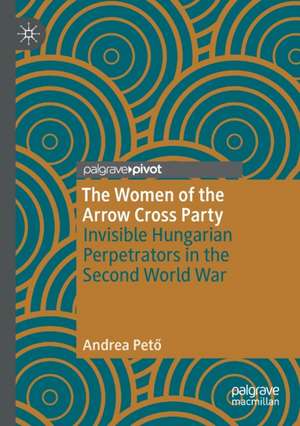The Women of the Arrow Cross Party: Invisible Hungarian Perpetrators in the Second World War
Autor Andrea Petően Limba Engleză Paperback – 4 sep 2021
| Toate formatele și edițiile | Preț | Express |
|---|---|---|
| Paperback (1) | 443.36 lei 6-8 săpt. | |
| Springer International Publishing – 4 sep 2021 | 443.36 lei 6-8 săpt. | |
| Hardback (1) | 448.97 lei 6-8 săpt. | |
| Springer International Publishing – 4 sep 2020 | 448.97 lei 6-8 săpt. |
Preț: 443.36 lei
Nou
Puncte Express: 665
Preț estimativ în valută:
84.84€ • 88.76$ • 70.47£
84.84€ • 88.76$ • 70.47£
Carte tipărită la comandă
Livrare economică 02-16 aprilie
Preluare comenzi: 021 569.72.76
Specificații
ISBN-13: 9783030512279
ISBN-10: 3030512274
Pagini: 96
Ilustrații: XI, 96 p. 6 illus.
Dimensiuni: 148 x 210 mm
Greutate: 0.15 kg
Ediția:1st ed. 2020
Editura: Springer International Publishing
Colecția Palgrave Macmillan
Locul publicării:Cham, Switzerland
ISBN-10: 3030512274
Pagini: 96
Ilustrații: XI, 96 p. 6 illus.
Dimensiuni: 148 x 210 mm
Greutate: 0.15 kg
Ediția:1st ed. 2020
Editura: Springer International Publishing
Colecția Palgrave Macmillan
Locul publicării:Cham, Switzerland
Cuprins
1. Introduction.- 2. Invisible Party Members.- 3. Invisible Political Actors.- 4. Invisible Defendants.- 5. Invisibility on Photographs.- 6. Conclusion.
Notă biografică
Andrea Pető is Professor in the Department of Gender Studies at Central European University, Budapest, Hungary and a Doctor of Science of the Hungarian Academy of Sciences. Her previous publications include six monographs and thirty-one edited volumes, while her works on gender, politics, the Holocaust and war have been translated into twenty-three languages. She was awarded the 2018 All European Academies (ALLEA) Madame de Staël Prize for Cultural Values.
Textul de pe ultima copertă
This book analyses the actions, background, connections and the eventual trials of Hungarian female perpetrators in the Second World War through the concept of invisibility. It examines why and how far-right women in general and among them several Second World War perpetrators were made invisible by their fellow Arrow Cross Party members in the 1930s and during the war (1939-1945), and later by the Hungarian people’s tribunals responsible for the purge of those guilty of war crimes (1945-1949). Itargues that because of their ‘invisibilization’ the legacy of these women could remain alive throughout the years of state socialism and that, furthermore, this legacy has actively contributed to the recent insurgence of far-right politics in Hungary. This book therefore analyses how the invisibility of Second World War perpetrators is connected to twenty-first century memory politics and the present-day resurgence of far-right movements.
Caracteristici
Analyses the actions, background, connections and the eventual trials of Hungarian female perpetrators in the Second World War through the concept of invisibility Examines why and how far-right women in general and among them several Second World War perpetrators were made 'invisible' by their fellow Arrow Cross Party members Argues that the legacy of these women remained alive throughout the years of state socialism, and has actively contributed to the recent insurgence of far-right politics in Hungary
